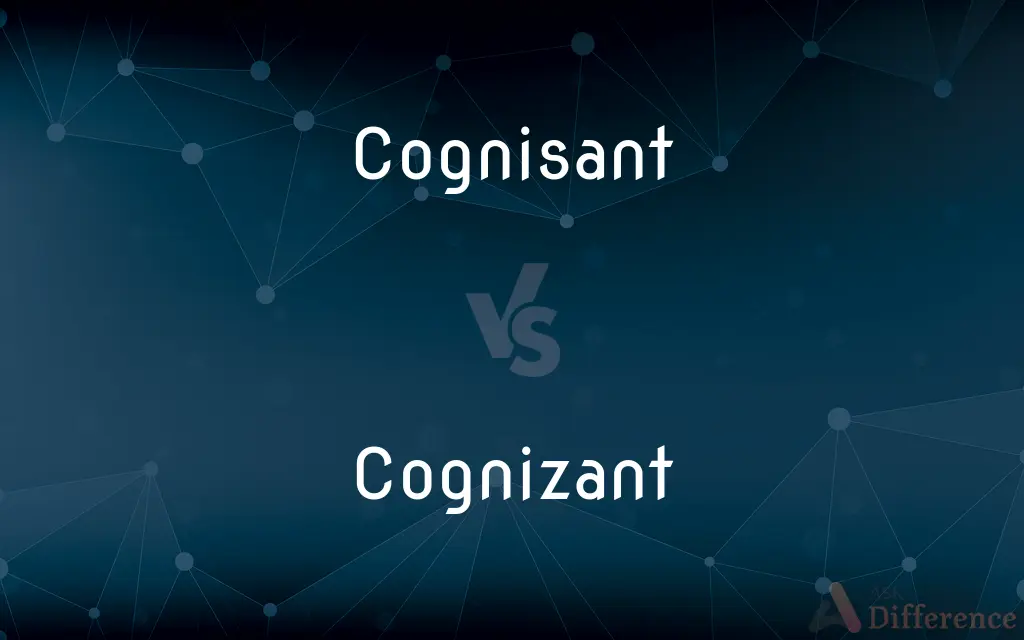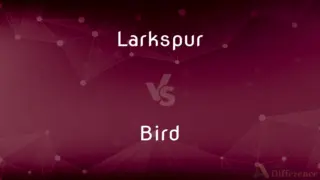Cognisant vs. Cognizant — What's the Difference?
By Tayyaba Rehman — Updated on November 23, 2023
"Cognisant" and "cognizant" mean being aware or having knowledge of something; "cognisant" is British spelling, "cognizant" is American.

Difference Between Cognisant and Cognizant
Table of Contents
ADVERTISEMENT
Key Differences
Cognisant and cognizant both refer to the state of being aware of or having knowledge about something. The primary difference lies in their spelling, where "cognisant" is the British English version, and "cognizant" is the American English spelling. Both terms are used interchangeably in the context of awareness or understanding.
In terms of usage, "cognisant" is more commonly seen in British English texts and publications. It aligns with the British English spelling conventions that often retain original forms of words. "Cognizant," on the other hand, reflects the American English preference for simplified spelling and is widely used in American literature and media.
The meaning of both cognisant and cognizant remains identical, denoting awareness or consciousness of a situation, fact, or circumstance. Whether in American or British English, the term implies a level of understanding or recognition of particular details or nuances.
From a linguistic perspective, the choice between cognisant and cognizant does not alter the meaning of a sentence but can reflect the writer's or speaker's geographical or cultural background. Both forms are accepted in global English language usage, depending on the audience and regional preferences.
In summary, cognisant and cognizant serve the same function in a sentence, conveying awareness or knowledge. The distinction lies in their spelling, which is a reflection of the different orthographic practices in British and American English.
ADVERTISEMENT
Comparison Chart
Spelling
British English spelling
American English spelling
Usage
Common in UK and Commonwealth countries
Predominantly used in the United States
Orthographic Tradition
Retains original spelling forms
Reflects simplified American spelling
Regional Preference
Favored in British English contexts
Preferred in American English contexts
Pronunciation
Generally pronounced the same as 'cognizant'
Pronounced similarly to 'cognisant'
Compare with Definitions
Cognisant
Aware of or informed about something.
She was cognisant of the company's financial issues.
Cognizant
Having awareness or knowledge of something.
He was cognizant of the risks involved.
Cognisant
Acknowledging or admitting a fact.
She was cognisant of her responsibilities.
Cognizant
Being conscious or informed about.
The team was cognizant of the changing market trends.
Cognisant
Having knowledge or being conscious of.
The manager was cognisant of the employees' concerns.
Cognizant
Mindful or aware of a situation.
He was cognizant of his role in the project.
Cognisant
Recognizing or understanding.
He remained cognisant of the time constraints.
Cognizant
Understanding or acknowledging.
She remained cognizant of the legal implications.
Cognisant
Being mindful or taking notice.
They were cognisant of the cultural differences.
Cognizant
Recognizing or perceiving.
They were cognizant of the need for change.
Cognizant
Cognizant is an American multinational technology company that provides business consulting, information technology and outsourcing services. It is headquartered in Teaneck, New Jersey, United States.
Cognizant
Fully informed; conscious.
Cognizant
; fully informed; having understanding of a fact.
The defendant is cognizant that this is a serious charge.
Cognizant
; self-aware.
Cognizant
Having cognizance or knowledge. (of).
Cognizant
(usually followed by `of') having knowledge or understanding;
Our youth are cognizant of the law
I am well aware of his limitations
Common Curiosities
Can "cognizant" be used in British English?
Yes, though "cognisant" is more typical in British English.
Are "cognisant" and "cognizant" interchangeable?
Yes, they are interchangeable but differ in regional spelling.
Are there any meaning differences between "cognisant" and "cognizant"?
No, they have the same meaning, referring to awareness or knowledge.
Which spelling should I use in academic writing?
Use "cognisant" for British English and "cognizant" for American English.
Is "cognisant" a recent British English development?
No, it's been in use for a long time, reflecting traditional spelling.
Is "cognizant" used in legal or formal documents?
Yes, "cognizant" is used in formal and legal contexts, especially in the US.
Do "cognisant" and "cognizant" have the same pronunciation?
Generally, yes, they are pronounced similarly.
Do dictionaries list both "cognisant" and "cognizant"?
Most comprehensive dictionaries list both, noting regional usage.
Can I use "cognizant" in UK publications?
It's acceptable, but "cognisant" is more conventional in the UK.
Is "cognisant" used in American English?
It's less common, as "cognizant" is the preferred American spelling.
Do "cognisant" and "cognizant" appear in international English exams?
Yes, both forms may appear, depending on the exam's regional focus.
Is "cognisant" commonly used in global English?
Yes, especially in contexts following British English conventions.
Can "cognisant" be used in casual conversation?
Yes, it's appropriate for both formal and informal settings.
Is it important to maintain consistency in spelling these words?
Yes, consistency in spelling according to the chosen English variant is important.
Are there any variations in usage based on context?
No, the context of use is the same for both spellings.
Share Your Discovery

Previous Comparison
Hose vs. Pipe
Next Comparison
Larkspur vs. BirdAuthor Spotlight
Written by
Tayyaba RehmanTayyaba Rehman is a distinguished writer, currently serving as a primary contributor to askdifference.com. As a researcher in semantics and etymology, Tayyaba's passion for the complexity of languages and their distinctions has found a perfect home on the platform. Tayyaba delves into the intricacies of language, distinguishing between commonly confused words and phrases, thereby providing clarity for readers worldwide.












































